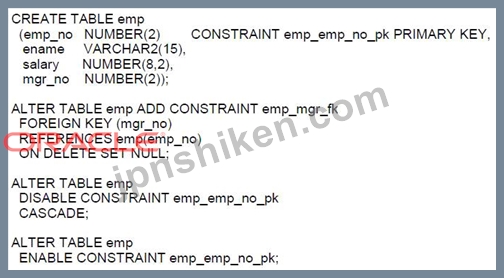有効的な1z0-071-JPN問題集はJPNTest.com提供され、1z0-071-JPN試験に合格することに役に立ちます!JPNTest.comは今最新1z0-071-JPN試験問題集を提供します。JPNTest.com 1z0-071-JPN試験問題集はもう更新されました。ここで1z0-071-JPN問題集のテストエンジンを手に入れます。
1z0-071-JPN問題集最新版のアクセス
「325問、30% ディスカウント、特別な割引コード:JPNshiken」
正常に実行されるこれらのSQLステートメントを調べます。

実行後に正しい2つのステートメントはどれですか?

実行後に正しい2つのステートメントはどれですか?
正解:B,E
After the execution of the given SQL statements:
* B. The primary key constraint will be enabled and IMMEDIATE. This is true. The last statement ENABLE CONSTRAINT emp_emp_no_pk; enables the primary key constraint immediately.
* E. The foreign key constraint will be enabled and IMMEDIATE. This is correct as well. The foreign key constraint emp_mgr_fk was not explicitly disabled, so it remains enabled and in the immediate checking mode.
Options A, C, and D are incorrect:
* A is incorrect because constraints are immediate by default; they are not deferred unless explicitly stated.
* C is incorrect because the foreign key constraint emp_mgr_fk was never disabled with the given statements.
* D is incorrect because there is no statement altering the foreign key constraint to a deferred state.
* B. The primary key constraint will be enabled and IMMEDIATE. This is true. The last statement ENABLE CONSTRAINT emp_emp_no_pk; enables the primary key constraint immediately.
* E. The foreign key constraint will be enabled and IMMEDIATE. This is correct as well. The foreign key constraint emp_mgr_fk was not explicitly disabled, so it remains enabled and in the immediate checking mode.
Options A, C, and D are incorrect:
* A is incorrect because constraints are immediate by default; they are not deferred unless explicitly stated.
* C is incorrect because the foreign key constraint emp_mgr_fk was never disabled with the given statements.
* D is incorrect because there is no statement altering the foreign key constraint to a deferred state.
- 質問一覧「148問」
- 質問1 ORACLE_DATAPUMPアクセスドライバを使用する外部テーブルについ...
- 質問2 このSQLステートメントを調べてください。 従業員から削除e 存在...
- 質問3 NEW_EMPLOYEESテーブルのデータを調べます。 (Exhibit) EMPLOYEE...
- 質問4 あらゆるタイプの同義語を作成する権限があります。 すべてのユ
- 質問5 各従業員とそのマネージャーの名前を返すこのステートメントを調
- 質問6 CUSTONERSテーブルの説明を調べます (Exhibit) CUSTONが主キーで...
- 質問7 切り捨てと削除について正しい2つのステートメントはどれですか
- 質問8 ORDER_ITEmsテーブルを調べます。 (Exhibit) QUANTITYが10の倍数...
- 質問9 ORDERSテーブルの説明を調べます。 (Exhibit) どの3つのステート...
- 質問10 正常に実行されるこのクエリを調べます。 empからjob、deptnoを...
- 質問11 PRODUCTSテーブルの次の説明を調べます。 (Exhibit) このテーブ...
- 質問12 グローバル一時テーブルについて正しいのはどれですか?
- 質問13 どの2つのステートメントが正常に実行されますか?
- 質問14 (Exhibit) エラーが発生する 2 つのクエリはどれですか?...
- 質問15 リレーショナルデータベースのテーブル間の関係を定義することに
- 質問16 単一行のサブクエリに関して正しい3つのステートメントはどれで
- 質問17 NVL、NVL2、およびCOALESCE機能について正しい2つはどれですか?...
- 質問18 このSQLステートメントを調べます 従業員から削除e 存在する場所...
- 質問19 正しいのはどれですか?
- 質問20 単一行関数に関して正しい 2 つの記述はどれですか?
- 質問21 Oracleデータベースのビューでデータ操作言語(DML)操作を実行...
- 質問22 PROMTIONSテーブルの説明を調べます。 (Exhibit) 各プロモーショ...
- 質問23 このSQLステートメントを調べてください。 (Exhibit) どちらが正...
- 質問24 自己結合について正しい2つのステートメントはどれですか?
- 質問25 Oracle の同義語に関して正しい 2 つの記述はどれですか?...
- 質問26 正常に実行されるこれらのコマンドを評価するCREATESEQUENCEord_...
- 質問27 PRODUCTSテーブルの説明を調べます。 (Exhibit) エラーなしで実...
- 質問28 * TABLESビューについて正しい2つのステートメントはどれですか...
- 質問29 Oracleデータベースのビューについて正しい3つのステートメント...
- 質問30 テーブル、ビュー、およびシーケンスに対するオブジェクト特権の
- 質問31 ビュー、インデックス、およびシノニムによって参照されるテーブ
- 質問32 新しいトランザクションが常に開始される3つの状況はどれですか
- 質問33 (Exhibit) CUBE のみを返す 2 つのクエリはどれですか?...
- 質問34 スカラーサブクエリ式について正しいのはどれですか?
- 質問35 ORDER BY句について正しい3つのステートメントはどれですか?...
- 質問36 正常に実行される次のステートメントを調べます。 (Exhibit) ど...
- 質問37 PRODUCT_STATUSテーブルの説明を調べます。 (Exhibit) STATUS列...
- 質問38 (Exhibit) 正しい 3 つの記述はどれですか?
- 質問39 BRICKSテーブルの説明を調べます。 (Exhibit) BRICKS_STAGEテー...
- 質問40 完全外部結合について正しい2つのステートメントはどれですか?
- 質問41 サブクエリが必要な2つのタスクはどれですか?
- 質問42 PROMOTIONSテーブルでは、PROMO_ BEGIN_DATE列はデータ型であり...
- 質問43 EMPLOYERSテーブルでこのデータを調べます。 (Exhibit) どのステ...
- 質問44 外部テーブルについて正しい2つのステートメントはどれですか?
- 質問45 次のコマンドを実行します。 TRUNCATE TABLE dept; どちらが正し...
- 質問46 このSQLステートメントを調べてください。 SELECT cust_id、cust...
- 質問47 EMPLOYEESテーブルの説明を調べます。 (Exhibit) あなたはこの失...
- 質問48 置換変数を持つ&および&&プレフィックスについて正しい...
- 質問49 このステートメントを調べてください。 (Exhibit) 正しい2つのス...
- 質問50 自己結合について正しいのはどちらですか?
- 質問51 特権と役割について正しいのはどれですか?
- 質問52 ユーザーANDREWに次のことを許可する必要があります。 1.CUSTOME...
- 質問53 データディクショナリについて正しいのはどれですか?
- 質問54 Oracleデータベースにテーブルを作成することについて正しいのは...
- 質問55 展示を表示し、COSTSテーブルとPROMOTIONSテーブルの構造を調べ...
- 質問56 NLS_DATE_PORMATがDD-MON-YYYYSH24:MI:SSに設定されているセッ...
- 質問57 自己結合に関して正しい 3 つの記述はどれですか?
- 質問58 CUSTONERSテーブルの説明を調べます。 (Exhibit) CUSTNOが主キー...
- 質問59 トリガーの代わりに定義されていないビューでDML操作を実行する...
- 質問60 このクエリを調べます。 SELECT employee_id、first_name、salar...
- 質問61 OracleデータベースとSQLについて正しい2つのステートメントはど...
- 質問62 オブジェクト権限で実行できる2つのアクションはどれですか?
- 質問63 このステートメントを調べてください。 姓を選択 従業員から 給...
- 質問64 PRODUCTSテーブルの次の説明を調べます。 次のコマンドを正常に...
- 質問65 システムとオブジェクトの特権について正しいのはどれですか
- 質問66 テーブル、ビュー、およびシーケンスに対するオブジェクト特権の
- 質問67 給与が最も低い3人の従業員の名前を返す2つのステートメントはど...
- 質問68 Oracleデータベースのタイムゾーン、日付データ型、およびタイム...
- 質問69 非等結合ステートメントのパフォーマンスについて正しいことは何
- 質問70 これらのステートメントを調べてください。 CREATE TABLE alter_...
- 質問71 次のステートメントを調べてください。 (Exhibit) 正常に実行す...
- 質問72 123という名前のテーブルを作成します。 どのステートメントが正...
- 質問73 トランザクションテーブルの説明を調べます。 (Exhibit) どの2つ...
- 質問74 シーケンスの要件の次のリストを調べます。 1.名前:EMP_SEQ 2....
- 質問75 単一行のサブクエリに関して正しい3つのステートメントはどれで
- 質問76 Oracleデータベースにテーブルを作成することについて正しいのは...
- 質問77 STORESテーブルには、行が挿入された日付を含むデータ型DATEの列...
- 質問78 from 句内の 2 つの結合条件が非等結合であるのはどれですか?...
- 質問79 この部分的なコマンドを調べます。 (Exhibit) このコマンドを正...
- 質問80 ENPLOYES テーブルの説明を調べます。 (Exhibit) 明示的なデータ...
- 質問81 このステートメントを調べてください。 SELECT1 AS id、 'John' ...
- 質問82 EMPテーブルの各部門の従業員名のコンマ区切りリストをアルファ...
- 質問83 関係の方向に含まれる3つの項目はどれですか?
- 質問84 EMPLOYEESテーブルの説明を調べます。 (Exhibit) どの2つのステ...
- 質問85 EMPLOYEESテーブルの説明を調べます。 (Exhibit) どのステートメ...
- 質問86 PRODUCT_DETAILSテーブルの説明を調べます。 (Exhibit) 正しい2...
- 質問87 * _TABLESビューについて正しい2つのステートメントはどれですか...
- 質問88 次のクエリを実行します。 SELECT TO CHAR(NEXT_DAY(LAST_DAY...
- 質問89 文字列Helloworldをellowozidに変換する2つのステートメントはど...
- 質問90 正常に実行されるこれらのSQLステートメントを調べます。 (Exhib...
- 質問91 サブクエリについて正しいのはどれですか?
- 質問92 DESCRIBEコマンドについて正しい3つのステートメントはどれです...
- 質問93 組み込みデータ型について正しい3つのステートメントはどれです
- 質問94 単一のOracleセッションで実行されるこれらのステートメントを調...
- 質問95 EMPLOYEESテーブルの説明を調べます。 (Exhibit) テーブルで最も...
- 質問96 COUNT関数について正しい2つのステートメントはどれですか?...
- 質問97 次のコマンドを実行します。 ALTERTABLEの従業員SETUNUSED(depa...
- 質問98 正常に実行される3つのステートメントを調べます。 pwfinによっ...
- 質問99 Oracleデータベースのビューについて正しい3つのステートメント...
- 質問100 どの2つのクエリが正常に実行されますか?
- 質問101 暗黙の変換を行う2つのステートメントはどれですか?
- 質問102 EMPLOYEESテーブルのデータを調べます。 (Exhibit) 各従業員の年...
- 質問103 EMPLOYEESテーブルの説明を調べます。 (Exhibit) NLS_DATE_FORMA...
- 質問104 UNIONなどのSET操作を使用するSQLステートメントについて正しい2...
- 質問105 内部結合と外部結合について正しい3つのステートメントはどれで
- 質問106 どの3つのクエリが正常に実行されますか?
- 質問107 次のコマンドを実行します。 TRUNCATETABLE部門; どちらが正しい...
- 質問108 トランザクションテーブルの説明を調べます。 どの2つのSQLステ...
- 質問109 演算子と条件の優先順位について正しいのはどちらですか
- 質問110 EMPテーブルの次の説明を調べます。 (Exhibit) 次のクエリを実行...
- 質問111 INVOICESテーブルのデータを調べます。 (Exhibit) CURRENCIESテ...
- 質問112 OracleDatabaseサーバーのトランザクションについて正しい2つの...
- 質問113 SQL機能はどれですか?
- 質問114 CUSTOMERSテーブルの説明を調べます。 (Exhibit) これらの結果を...
- 質問115 条件付きINSERTALLについて正しい2つのステートメントはどれです...
- 質問116 CUSTOMERS テーブルには、データ型数値の CUST_CREDT_LIMIT 列が...
- 質問117 ORDERSテーブルのデータを調べます。 (Exhibit) INVOICESテーブ...
- 質問118 次のコマンドを実行します。 SQL> DEFINE採用日= '01 -APR -2...
- 質問119 このクエリを調べます。 SELECT 2 FROM dual d1 CROSS JOIN dual...
- 質問120 このクエリを調べます。 SELECT TRUNC(ROUND(156.00、-2)、-1...
- 質問121 展示を表示し、ORDERSテーブルの構造を調べます。 列ORDER_MODE...
- 質問122 データディクショナリに変更を加える2つのステートメントはどれ
- 質問123 このクエリを調べます。 デュアルから間隔「100」の月の期間を選...
- 質問124 従業員テーブルの説明を調べます。 (Exhibit) 次の要件を調べて...
- 質問125 CREATETABLEコマンドについて正しい3つはどれですか。...
- 質問126 プロモーションテーブルの説明を確認します。 各プロモーション
- 質問127 ORDER BY句について正しい2つのステートメントはどれですか?...
- 質問128 スカラーサブクエリ式について正しいのはどれですか?
- 質問129 複合クエリで使用されるINTERSECT演算子について正しい説明はど...
- 質問130 SQLステートメントでINTERSECTなどのSET演算子を使用して複合ク...
- 質問131 GLOBAL TEMPORARY TABLESについて正しい3つのステートメントはど...
- 質問132 次のSQLステートメントを評価します SQL> SELECT promo_id、p...
- 質問133 銀行アプリケーション用のテーブルを作成するように依頼されまし
- 質問134 SALESテーブルの説明を調べます。 (Exhibit) SALESテーブルには5...
- 質問135 CURRENT_TIMEITAMPについて正しい2つのステートメントはどれです...
- 質問136 複数のテーブルのINSERTステートメントについて正しいのはどれで...
- 質問137 この部分的なステートメントを調べてください。 empからename、s...
- 質問138 制約の使用について正しいのはどれですか?
- 質問139 BRICKSテーブルを調べます。 (Exhibit) あなたはこのクエリを書...
- 質問140 ORDERSテーブルには、日付タイプDATEの列ORDER_DATEがあります。...
- 質問141 これらのステートメントを調べてください。 CREATE TABLE dept(...
- 質問142 どのステートメントが正常に実行されますか?
- 質問143 演算子の優先順位の規則について正しい2つのステートメントはど
- 質問144 展示物をVievし、製品情報と在庫表の構造を調べます。 供給部門...
- 質問145 MERGEステートメントについて正しい2つはどれですか?
- 質問146 正しい2つのステートメントはどれですか?
- 質問147 Oracle結合とANSI結合の構文について正しい3つのステートメント...
- 質問148 どの2つのクエリが正常に実行されますか?

